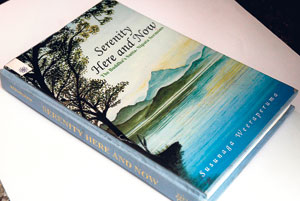The last 47 sermons of the Sutta Nipata where the Buddha had spoken out to a society which was highly developed, now comes in the well-compiled book, Serenity Here and Now, written in lucid style.
As indicated by the author, every chapter contains archaic and abstruse verses “rendered in a modern and readily intelligible idiom” which helps the reader enjoy the book from the first page to the last.
The preface states that Serenity Here and Now consists of the last 47 sermons of the Buddhist Sutta Nipata with commentaries on some of them by the author. The forerunners of this publication are The First and Best Buddhist Teachings of the Buddha (selected essays) and Nirvana the Highest Happiness, a trilogy which spells out what the Master taught.
The Buddha’s teachings were in a society, ethical in outlook, where 62 other known religions were present.
While Dr. Susunaga Weeraperuma had been inspired from his childhood to learn about Buddhism as it is generally known to a Buddhist society, in adulthood he had spiritedly researched into Buddhist philosophy with the penetrating mind of a student.
He begins his 238-page effort with a basic subject: Codes of Conduct for Renunciants and Lay Persons, following it up with the chapter, Moving Forwards (towards Pabajja). The dialogue between Gotama Buddha and Mara (Namuchi) portraying His serious effort, a struggle amidst obstacles, to gain Enlightenment is in beautiful verse, followed by many other similar chapters.
Gift-giving and Merit-Making; Rare is the Sight of the Buddha; and There is Only One Truth are three interesting chapters. Some questions put to the Master by Magha and His answers in the first of these chapters were:
“O Gotama, I am a generous giver of gifts…..tell me Gotama by so giving, do I acquire much merit?”
The Buddha: “Certainly young man. In so giving
From rightly gained riches
One does obtain a lot of merit.”
The conversation continues: “O kind Gotama, the yellow robed homeless wanderer as you are, do tell me, if a liberal householder, being keen on merit making, wishes to give to others food and drink, to whom should the offerings be made to have a purificatory effect on the donor?”
The Buddha: “O Magha, He who makes sacrifices
For the purpose of acquiring merit,
Such as giving food and drink,
These efforts will be crowned with success
Provided, the offerings are given
To gift worthy recipients.”
Magha: “Do tell me of gift worthy recipients.”
Gotama Buddha: “Those who wander the face of the earth without craving for anything,
Having nothing,
Being perfect and calm to them, let the Brahmin make an offering.”
Similarly, the Buddha had replied to the same question later that those who have broken all bounds and fetters, who are tamed and fully realized and are free from suffering and desire, and have given up anger being taintless are worthy to accept an offering.
Whilst the author is to be commended for his deep study of the Sutta Nipata, his wife Dr. Claudia Weeraperuma has enriched the book with simple, attractive and meaningful sketches.
The chapters of this publication are full of verses, which any reader would be delighted to imbibe and learn. This is a book that should be on the shelves of all college and university libraries. |

